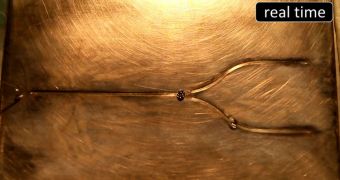Though normal people spend their lives trying to avoid spilling water on their keyboards and inside their computers, researchers say that water droplets could become the power source of a new generation of machines.
These droplets could easily be turned into bits, which could then be operated just as normal bits are today, say researchers at the Aalto University, in Finland. The secret is to use a water-repellent surface.
In a series of experiments conducted at the university, investigators figured out that, once placed on such a surface, droplets would literally bounce off each other. The next step was to create a series of small channels, made up of the same material, to guide the droplets.
The researchers say that the water acted just like digital bits do inside memory devices, or when performing logical operations. These are the most basic levels of computing, the team adds, quoted by Innovation News Daily.
“I was surprised that such rebounding collisions between two droplets were never reported before, as it indeed is an easily accessible phenomenon: I conducted some of the early experiments on water-repellent plant leaves from my mother's garden,” expert Henrikki Mertaniemi says.
The team leader holds an appointment as an applied physics researcher at the Aalto University. He likens the way water droplets rebound off each other on repellent surfaces to the motions of billiard balls on their cloth.
A flip-flop memory setup was already demonstrated, by constructing a simple channel that forks into two others. At the crossroads, experts placed a water droplet, and then sent another one down the channel. When they collided, the stationary droplet was alternatively sent on either of the two channels.
This experiment was repeated 100 times without error, which means that the approach is ready to be employed in practical applications. Additional details of the experiments were published in the September 4 issue of the top journal Advanced Materials.
Though it seems unlikely that water-based computers would replace desktops anytime soon, they could come in handy for situations where power sources are not available, for example during space exploration missions, or when establishing a base on the Moon or Mars.
Over the past couple of years, a large number of new ideas related to future generations of computers have been proposed, including for machines that would use DNA to store and handle data. It will be interesting to see which of them is turned into tangible reality.

 14 DAY TRIAL //
14 DAY TRIAL //